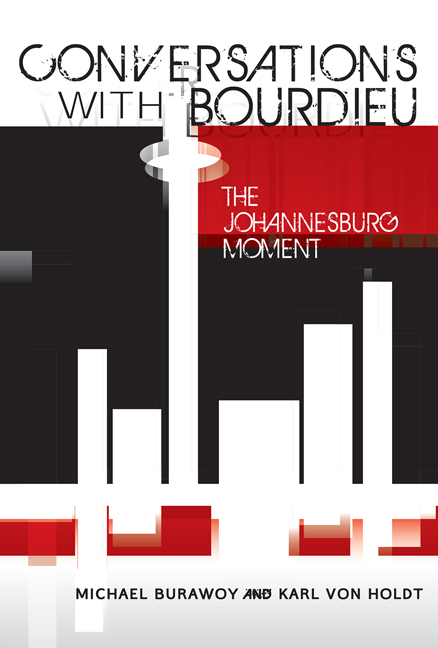Book contents
- Frontmatter
- Contents
- Abbreviations and acronyms
- Preface
- Prologue The Johannesburg Moment
- Acknowledgements
- CONVERSATION 1 SOCIOLOGY AS A COMBAT SPORT
- CONVERSATION 2 Theory and Practice
- CONVERSATION 3 CULTURAL DOMINATION
- CONVERSATION 4 COLONIALISM AND REVOLUTION
- CONVERSATION 5 PEDAGOGY OF THE OPPRESSED
- Freire Meets Bourdieu
- Discipline
- CONVERSATION 6 THE ANTINOMIES OF FEMINISM
- CONVERSATION 7 INTELLECTUALS AND THEIR PUBLICS
- CONVERSATION 8 MANUFACTURING DISSENT
- Epilogue Travelling Theory
- Bibliography
- Index
Discipline
from CONVERSATION 5 - PEDAGOGY OF THE OPPRESSED
Published online by Cambridge University Press: 20 April 2018
- Frontmatter
- Contents
- Abbreviations and acronyms
- Preface
- Prologue The Johannesburg Moment
- Acknowledgements
- CONVERSATION 1 SOCIOLOGY AS A COMBAT SPORT
- CONVERSATION 2 Theory and Practice
- CONVERSATION 3 CULTURAL DOMINATION
- CONVERSATION 4 COLONIALISM AND REVOLUTION
- CONVERSATION 5 PEDAGOGY OF THE OPPRESSED
- Freire Meets Bourdieu
- Discipline
- CONVERSATION 6 THE ANTINOMIES OF FEMINISM
- CONVERSATION 7 INTELLECTUALS AND THEIR PUBLICS
- CONVERSATION 8 MANUFACTURING DISSENT
- Epilogue Travelling Theory
- Bibliography
- Index
Summary
My own involvement in the struggle for democracy started in the early 1980s in the adult literacy movement inspired by the work of Paulo Freire. We worked in the huge informal settlement of Crossroads outside Cape Town, where thousands of Africans from the poverty-stricken hinterlands of the Eastern Cape had settled, breaking the pass laws and under constant threat of mass eviction by the police. Every evening we taught to the hiss of gas lamps – there was no electricity – in the classrooms of the local school.
Our practices were participatory and democratic, using pictures and stories to elicit dialogue through which, we hoped, the structural violence of apartheid and capitalism would be exposed. Instead of rows of pupils with the teacher standing in front, we sat in a circle, with the ‘coordinator’ – as we called the teacher – sitting in the circle with the learners. The learners entered gamely into this process, but at times they were frustrated and perplexed by the endless litany of questions they were asked about the blindingly obvious hardships they faced.
One evening, one of our learners, a strong and intelligent woman who had spent five or six years in formal schooling, came in bearing a stick. When the session started, she rose and came to the front with the stick, turned and faced the circle of learners, and said, ‘This is how we want you to teach’, wielding the stick fiercely in the direction of the rest of the class.
We were crestfallen. ‘The old ways die hard’, we told ourselves. But the incident did make us wonder whether we were serious enough about teaching the rules and structures of language, and whether our approach was too loose and open-ended. How astute she was about the significance of discipline and authority in education, I think now, after reading Michael's dialogue between Paulo Freire and Pierre Bourdieu (and Antonio Gramsci).
After some time, we concluded that Freire did not work – at least as he had envisaged. We could not transcend the authority of the teacher, especially (but not only) when the teacher was white, and the exchange of views and knowledge was not equal.
- Type
- Chapter
- Information
- Conversations with BourdieuThe Johannesburg Moment, pp. 118 - 122Publisher: Wits University PressPrint publication year: 2012



